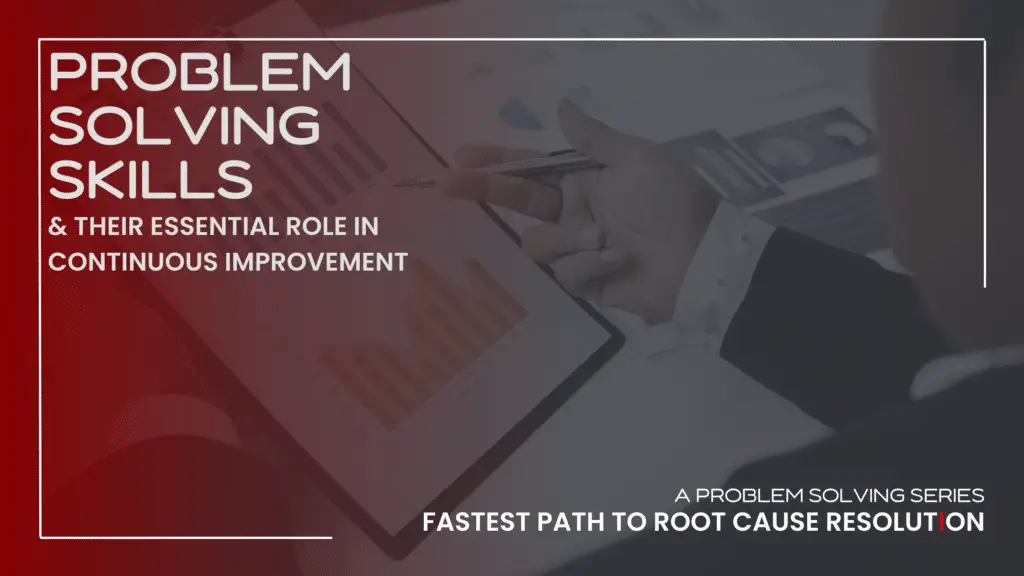Improving your problem-solving skills is essential to Continuous Improvement

Now that you’re familiar with the Six Key Elements of Problem-Solving Methods, it’s a good time to consider why improving your problem-solving skill is important for continuous improvement.
The market demands that businesses continually innovate to stay competitive. Innovation brings changes to products and processes and with that comes new challenges. This is where problem-solving skills shine in organizations with a focus on continuous improvement.
If your organization has yet to implement a continuous improvement plan, it’s worth considering. According to KaiNexus, companies that implement continuous improvement plans see an average of 1 in 3 improvements has a financial impact.
The challenges faced by companies in today’s rapidly evolving industrial landscape are numerous, from increasing competition and changing market dynamics to technological advancements and regulatory pressures. In such a dynamic environment, organizations must embrace a culture of continuous improvement. At the heart of this ethos lies the ability to effectively solve problems and cultivate robust problem-solving skills among employees at all levels.
In this article, we delve into why improving problem-solving ability is not only important but also beneficial and essential to driving continuous improvement in the industrial world.

Problem solving skills create an Indispensable Toolkit
Problem-solving skills are akin to a Swiss Army knife in one’s toolkit—they are versatile, adaptable, and indispensable. Improving them is integral to continuous improvement for several reasons.
- Adaptability: In an ever-evolving environment, unforeseen obstacles are inevitable. The ability to swiftly adapt and tackle these challenges head-on is crucial for maintaining momentum toward improvement.
- Innovation: Problem-solving often requires thinking creatively. By encouraging innovative thinking, individuals and teams can uncover novel solutions that propel them forward in their pursuit of improvement.
- Efficiency: Efficient problem-solving streamlines processes and minimizes downtime. This not only saves valuable resources but also fosters a culture of productivity and progress.
- Resilience: Setbacks are part of any improvement journey. Strong problem-solving skills equip individuals and teams with the resilience to bounce back from setbacks and keep moving forward.
- Continuous Learning: Every problem presents an opportunity to learn and grow. By embracing problem-solving as a learning experience, individuals and organizations can continually refine their approaches and strategies.
Problem Solving is fundamental in an Industrial Setting
Knowing that problem-solving is key for any company, we must recognize that improving problem-solving ability is fundamental to continuous improvement in an industrial setting for several reasons:
- Customer Satisfaction: Continuous improvement driven by problem-solving leads to better products and services. Satisfied customers are more likely to remain loyal and recommend the company to others, contributing to long-term success.
- Employee Empowerment: Fostering a culture of problem-solving empowers employees at all levels to take ownership of their work and contribute to the company’s success. This sense of ownership can boost morale, engagement, and retention.
- Efficiency Enhancement: Problem-solving skills enable workers to identify inefficiencies, bottlenecks, and process obstacles. By addressing these issues, operations can become more streamlined, reducing wasted time, resources, and effort, thus reducing costs.
- Quality Control: Effective problem-solving helps maintain and enhance product quality. Workers who can quickly identify and rectify defects or deviations from standards contribute to consistently high-quality outputs.
- Staying Competitive: Problem-solving fosters innovation by encouraging employees to think creatively and develop unique approaches to challenges. In an industrial context, this can lead to the introduction of novel technologies, processes, and products, keeping the company competitive in the market.
- Adaptability to Change: Industries are subject to constant change, whether it is due to technological advancements, market fluctuations, or regulatory shifts. Employees with strong problem-solving skills are better equipped to adapt to these changes, ensuring the company remains agile and resilient.
How To Cultivate a Problem-Solving Skill Set
Enhancing problem-solving abilities requires a combination of mindset, techniques, and practice. Here’s how individuals and organizations can cultivate this vital skill set:
- Develop a Growth Mindset:
Embrace challenges as opportunities for growth rather than setbacks. A growth mindset fosters resilience and a willingness to learn from mistakes, both of which are essential for effective problem-solving. Make problem-solving a habit. Approach each challenge with the mindset of continuously seeking better ways to address it. - Understand the Problem:
Before jumping into solutions, take the time to thoroughly understand the problem at hand. Break it down into its component parts, identify underlying causes, and consider potential implications. - Utilize Structured Approaches:
Frameworks such as the scientific method, root cause analysis, and design thinking provide structured approaches to problem-solving. Familiarize yourself with these methodologies and apply them as appropriate. - Encourage Collaboration:
Two heads are often better than one when it comes to problem-solving. Foster a collaborative environment where diverse perspectives can contribute to more robust solutions. - Practice Reflective Thinking:
After implementing a solution, take the time to reflect on its effectiveness. What worked well? What could be improved? Incorporate these insights into future problem-solving endeavors. - Seek Feedback:
Solicit feedback from peers, mentors, or supervisors. Constructive feedback can offer valuable insights and perspectives that may not have been considered otherwise.
In short, improving problem-solving ability is essential for continuous improvement in the industrial world because it drives efficiency, quality, innovation, cost reduction, adaptability, employee empowerment, and customer satisfaction. By investing in problem-solving skills development, companies can stay competitive, resilient, and successful in an ever-evolving marketplace.
At Shainin, we work to transform how companies solve problems so they can solve any problem faster and more efficiently. Our technologies provide structure and tools to support continuous improvement at all levels and all departments within the organization. By partnering with Shainin, you will ensure that your teams will be equipped to face all continuous improvement topics, from technical problem-solving to business problem-solving, but also in preventing problems from occurring for new products, new processes, and new customer applications. Growing your team’s problem-solving skills will ensure you meet your short-term improvement objectives and galvanize your continuous improvement strategy.
About the Author
Technical Director - Europe & Asia
Richard Sauquet
As the Problem-Solving & Operational Excellence Technical Director for Europe and Asia at Shainin, I help clients overcome their most challenging and unsolvable problems in product and process reliability, performance, and quality. With over 20 years of experience in applying the Shainin RedX methodology, a structured and convergent approach to root cause analysis, I have successfully solved hundreds of problems across various industries, such as automotive, aerospace, healthcare, and energy.
My mission is to transform the problem-solving and operational excellence culture of my clients, by enabling them to achieve sustainable and breakthrough improvements without huge investments or long time frames. I also share my passion and expertise in problem-solving by training and coaching their teams on how to use the Shainin RedX methodology and other methods, By doing so, I empower them to become more efficient, innovative, and proactive in preventing and solving problems.




Great article!